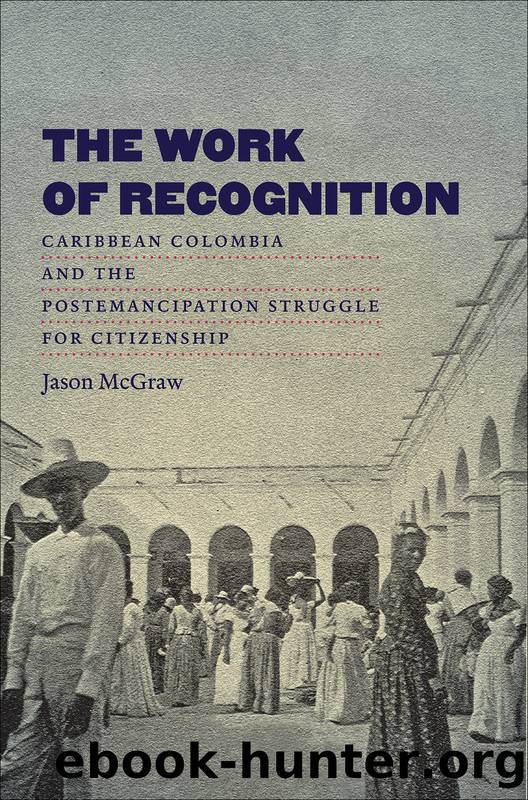The Work of Recognition by Jason McGraw

Author:Jason McGraw
Language: eng
Format: epub
Publisher: The University of North Carolina Press
Published: 2014-08-14T16:00:00+00:00
FORGETTING PEOPLE OF COLOR
Jesuit designs to stamp out Liberalism by missionizing the coast complemented the breakdown of Liberal Party organization. Denied access to either elective office or newspapers, with many leaders forced into exile, Liberal politics all but ceased to exist publicly in the years after 1885. Liberals’ ability to regain their lost standing was hampered by Nationalist paranoia and by new legal definitions of subversive that discredited many of the civic traditions of the Rionegro era.41 Not until the early 1890s did party members found new outlets of opinion and again start electioneering, often by forming alliances with anti-Nationalist Conservatives. When this new effort began, however, the party had few resources, no chance of winning majority power, and internal divisions that had persisted from the time of the Gaitán campaign. With the war faction depleted, the Liberal directorate under Aquileo Parra and Luis A. Robles conceded to the Nationalists on centralism, the church, marriage, and education—all concessions, to be sure, with origins before the party’s defeat in 1885. Their stated positions did not venture much farther than advocating minority congressional representation, and even militant anti-Regeneration Liberals like former president Santiago Pérez made few overtures to a bygone popular politics. The directorate’s first tentative alliances with party members outside the national capital came only after 1891, which took place under continued governmental harassment and among party members split over issues of electoral abstention and political violence.42
In this new political culture, lettered Liberals at home or abroad turned to their writing as a recourse, and in several works they depicted blackness to make sense of their defeat. The historical novel Lo irreparable (1889), by anticlerical radical and prolific author José María Vargas Vila, is set on a plantation and invokes the social death of racial slavery and the isolation of free blacks as meditations on the Liberal Party’s demise. In “El rey de los espantos,” Eduardo Posada’s story of putrefaction and mass killing that ends with the failure of Gaitán’s Caribbean campaign, the atmosphere of loss is heightened by a lone boga “singing the verses of Candelario Obeso.”43 Posada was not alone in appropriating Obeso’s metaphor of sorrow as a lament for the Liberals’ downfall. Santiago Pérez Triana, son of the former president, covertly fled the country in August 1893 to avoid imprisonment. In his memoir of flight, Pérez included a stanza from Obeso’s “Cancion der boga ausente” as the epigraph, although Pérez’s infelicitous misquoting—“Bogá, Negrito, bogá”—may have evoked black minstrelsy for Spanish readers. Black personae both fictional and real had come to stand in for the suffering of lettered men.44
Liberal journalist and former abolitionist Medardo Rivas found this poetic bathos an insufficient response to political circumstances and set out to conceive an alternative intellectual project to reclaim the party’s history and, by extension, future prospects in Colombia. His last major work, Trabajadores de la tierra caliente (Laborers of the Hot Land, 1899), told the story of the young men who at midcentury had left Bogotá for the Magdalena Valley to seek their fortunes in the booming tobacco industry.
Download
This site does not store any files on its server. We only index and link to content provided by other sites. Please contact the content providers to delete copyright contents if any and email us, we'll remove relevant links or contents immediately.
Tools of Titans by Timothy Ferriss(8394)
Change Your Questions, Change Your Life by Marilee Adams(7780)
Deep Work by Cal Newport(7083)
Playing to Win_ How Strategy Really Works by A.G. Lafley & Roger L. Martin(6304)
Man-made Catastrophes and Risk Information Concealment by Dmitry Chernov & Didier Sornette(6019)
Big Magic: Creative Living Beyond Fear by Elizabeth Gilbert(5771)
Digital Minimalism by Cal Newport;(5764)
Ego Is the Enemy by Ryan Holiday(5448)
The Slight Edge by Jeff Olson(5417)
The Motivation Myth by Jeff Haden(5212)
The Laws of Human Nature by Robert Greene(5208)
Stone's Rules by Roger Stone(5088)
Tuesdays with Morrie by Mitch Albom(4784)
Eat That Frog! by Brian Tracy(4540)
Rising Strong by Brene Brown(4459)
Skin in the Game by Nassim Nicholas Taleb(4248)
The Money Culture by Michael Lewis(4207)
Bullshit Jobs by David Graeber(4190)
Skin in the Game: Hidden Asymmetries in Daily Life by Nassim Nicholas Taleb(4006)
